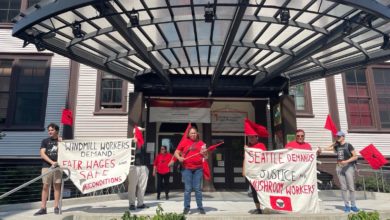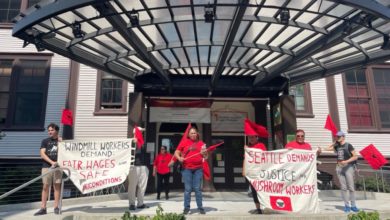On May 14, the Seattle City Council unanimously approved a new employee hours tax on large businesses intended to fund city housing programs and address the ongoing housing crisis. Although the legislation as originally proposed would have raised $75 million per year, the legislation which was ultimately approved included last-minute amendments to the rate, decreasing the estimated revenue to $48 million per year, as well as adding a five-year “sunset clause” that will require the tax to be renewed by the City Council in 2023. The City Council has announced its plans to spend this money towards the housing crisis, with 66 percent intended for development of new affordable housing units and 33 percent going to bolster housing services such as shelter beds, housing subsidies and other programs to alleviate the immediate need. The Transit Riders Union, one of the organizations that pushed for the “head tax” as it is known, called the passage of the bill “a huge victory.”
“Is this bill everything we hoped for? No. Is it a major step forward? Absolutely….In the City and State with the #1 most regressive tax system in the country, [we] passed major progressive tax legislation that moves the needle on what is politically possible [and] prodded a corporate empire notoriously averse to public statements to show their true colors [Amazon], setting off a national debate on corporate power over cities.” (Transit Riders Union)
An ongoing emergency
The housing situation in Seattle definitely warrants the term “crisis.” Former mayor Ed Murray declared a state of emergency in an effort to address it in 2015, yet conditionshave only continued to worsen, with an estimated 11,000 people currently experiencing homelessness in Seattle. The number of annual deaths due to homelessness is reaching a new record of 169, a count which has more than doubled in the past six years.
$400 million per year to solve the problem
A report commissioned by the Seattle Chamber of Commerce concluded that Seattle has an affordable housing shortage. The city needs approximately 14,000 units of housing beyond current levels, and estimates the cost of bridging the gap in housing units and services at nearly $400 million. By contrast, the budget just approved by City Council is estimated to fund only 591 new units of affordable housing. Even the originally proposed $75 million would not have sufficed to end the crisis facing Seattle’s residents.
The conclusions of the McKinsey report broke down arguments made by local businesses who opposed the tax, many of whom had insisted that the city government should instead focus on efficiency and alleged widespread misuse of city funds. Amazon and other business leaders also characterized the tax as a “penalty for hiring” or as disrespectful to the economic growth supposedly created by them. Although only 3 percent of Seattle’s businesses would ultimately be eligible for the tax, many of these companies made threats to decrease or stop doing business in the city. Amazon famously threatened to redirect new employees and halt planning on upcoming construction projects, holding hundreds or thousands of jobs hostage just at the idea of a tax forcing the company to pay back some small percent of what it has accrued from operating in Seattle.
Seattle budget priorities
All that is not to say that the city government spends its money well. On the day of the City Council vote on the employee hours tax, several last-minute amendments were proposed. As we have seen, the amendment to decrease the tax amount passed, provisions to convert it into a permanent payroll tax were removed, and an additional amendment added a startlingly short sunset clause of just five years, after which the tax will expire. Even with all of these last-minute additions, an amendment to commit the city government not to use any of the new tax revenue toward paying for “sweeps” – in which police officers round up and forcibly evict homeless people from tents and tent encampments – failed to pass. The Seattle City Council evidently likes to keep its options open. although the sponsors of the bill suggest a spending breakdown of 66 percent housing units and 33 percent housing services spending, these suggestions are not binding, and Mayor Jenny Durkan (a vocal supporter of the sweeps) has a say in the final allocation of the funds.
There have been over 100 such sweeps so far in 2018 alone. Despite City Council promises to decrease them, they are occurring at a rate of about five each week. These sweeps aren’t free; they represent a major investment by the city in what they shockingly categorize as a strategy to address the housing crisis in Seattle. The cost to pay police officers, load equipment, dispose of trash and campers’ personal possessions left at the time of the sweep adds up, and in 2017 Seattle authorized this harassment and abuse of the homeless population at a cost of over $10 million. As a final slap in the face, there’s nothing stopping Seattle from using the newly approved taxes to fund even more of these sweeps!
The fight goes on
Housing activists barely had a week to savor their victory before the Chamber of Commerce and other business interests raised $300,000 to start a campaign against the tax, seeking to roll it back by putting the issue on the ballot. The political and legislative battle over the housing crisis and taxation more generally in Seattle points to the underlying contradictions at the heart of liberal democracy. Although many progressive people and organizations fought for the tax as the best way to generate the needed funding, and several city council members willingly supported it, even a city government was unable to completely withstand the threats and pressure from capitalists who have been benefitting from the low cost of doing business in Seattle. All those who fought this battle or supported it should be able to clearly see that even the one of the most progressive city governments ultimately blinked when Amazon made its threats. Armed with that knowledge, all progressive people in Seattle and across the U.S. should fight for socialism, where the needs of the people are met as a first priority, rather than begging the ruling class for scraps.






